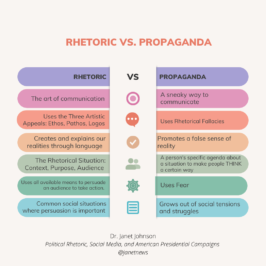Rhetoric VS. Propaganda
There may be confusion when people think about Rhetoric (persuasion) and Propaganda.
Socrates did call Rhetoric “Cookery” at one time, but it’s the art of communication.
Rhetoric uses language to convey ideas and our reality. Rhetoric helps us understand our world. Yes, people use words to move people to action–but rhetoric is how we put together words to build our credibility, use our logical wits, and express emotion. For example—it’s how your child convinces you, yes; they need another cookie.
Propaganda is a type of rhetorical technique where it uses words to manipulate to make people think a certain way, usually through fear. Propaganda usually grows out of struggles and tensions in society–whereas rhetoric usually grows out of a need to persuade because of a common social situation–never out of chaos alone.
Yes, Propaganda moves people to action. Propaganda plants seeds and is sometimes subtle. The seed will then grow into either doubt or acceptance. The propagandist then frames the (mis)information, so the (mis)information takes root in the audience’s minds. Propagandists make the (mis)information seem like the “T”ruth. The propagandist wants the audience to adopt their ideology as reality.
Whereas Rhetoric is merely a way we move people to think—not HOW to think. Rhetoricians want people to understand and seek out the truth through reasonable and credible means. Propagandists want the audience to adopt their doubts, fears, or acceptance of a simulated reality.
Spreading propaganda is more accessible now with social media. We scroll mindlessly through our feeds to question the validity of a friend’s or follower’s share. Memes are planting seeds of doubt, and deep fake videos make it as if credible people are sharing fearful information again—to tell you HOW to think.
Next time think about the difference between rhetoric and propaganda. Are the words coming from a place of logic, credibility and not from fear alone? Or is the message telling you HOW to think and make you doubt the reality you know?
Combating these new propaganda machines that are blasting our social media platforms will take more education because people don’t know propaganda when they see it. And if we can make people question their news feeds—the more we can stop the mindless propaganda sharing.




